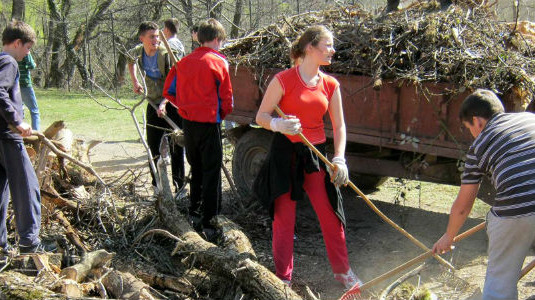Teens Turn Around their Local Communities through the YouthBank Program
In Bosnia and Herzegovina (BiH), young people face serious obstacles that hinder their active involvement in the local community. Despite significant educational reforms in the past decade and a pool of educated adolescents available, Bosnia currently has the highest youth unemployment rate in the world, at 57.5 percent, according to World Bank data (2014). Moreover, most young people today hope for a future outside of their home country.
The Mozaik Community Development Foundation is a social enterprise with a mission to further social and economic development in BiH, particularly on a local level. Founded in 2002 and based in Sarajevo and Banja Luka, Mozaik seeks to counter the lack of youth involvement by encouraging young people to participate in projects in rural communities. After seeing the success of the YouthBank program in Northern Ireland, Mozaik brought the program to Bosnia and adapted it. Its goal is to foster youth participation and involvement in decision-making on youth strategies at the local, regional, and state level. With a grant from the Balkan Trust for Democracy (BTD), along with funding from the Community Foundation of Northern Ireland (CFNI), the National Endowment for Democracy, and USAID, between 2008 and 2013, 965 YouthBank projects were funded with a total budget of €1.8 million.
The YouthBank initiative was born in 2008 in Northern Ireland, and is currently run in 22 countries around the world. Mozaik’s YouthBank programs in BiH now account for almost one-fifth of all YouthBanks in the world, making it one of the most successful examples of this model.
''The YouthBank program and model empower youth to reach their potential and to cooperate in a multi-ethnic context,'' said Željko Pauković, program director at Mozaik.
''On a personal level, it changes youth to initiate the solving of problems,” he explained. “This change on the personal level contributes to a change on a community and societal level.
Each YouthBank board, consisting of ten members between the ages of 13 and 15, reviews applications made for local project proposals to benefit the local community, and decides to which programs to allocate funds.
Pauković emphasized that the very core of the program is the idea of creating programs by youth, for youth. ''What is specific to this model is that these youth recognize their community priorities and get recognition for their work,'' said Pauković.
In rural communities, where there is often no communal place for young people to meet, projects focus on adopting community spaces for teenagers to use. Successful projects include a youth club taking over an unused space and transforming it into a community center for education, cultural, or sport purposes. While some initiatives might include building a basketball or football arena, others might focus on cultural activities or technology, for instance starting a local radio station.
Mozaik allocates between €8,000 and 10,000 are allocated to each municipality’s YouthBank to support between up to 20 local projects, such as improving parks and sports fields or organizing cultural events or public space clean-ups.
The YouthBank model uses a bottom-up approach. First, the program builds up the local level, mobilizing and sharing best practices between municipalities. At the higher level, YouthBank works to integrate their model into strategy papers and government policies. This is where the Balkan Trust for Democracy has played a crucial role, noted Pauković.
Essentially, the support of BTD has enabled the program to integrate their model into the municipal budgets and strategic documents by providing key financial stability. Funds for YouthBanks are now clearly outlined in the official budgets of local municipalities, rather than allocated on an ad-hoc activity basis.
Pauković highlighted that, ''after several years, we have been recognized by ministries and cantonal ministries to promote this model.''
He also emphasized that YouthBanks' close cooperation with local governments and the community's recognition of the projects' positive affect are vital to the program's success. In fact, municipalities match the funds given by donors. While 46 percent of funding comes from Mozaik and its donors, more than half of the funds are mobilized by local municipalities, businesses, and organizations.
YouthBank’s successful model is catching on elsewhere. Starting last year, the Mozaik Foundation began sharing the YouthBank model with the Divat Foundation in Serbia, which is also a grantee of the BTD, to develop their own program, providing them with initial training and information-sharing.
The implementation of these YouthBank-funded projects demonstrate how youth can make a significant impact when they are actively engaged in society.